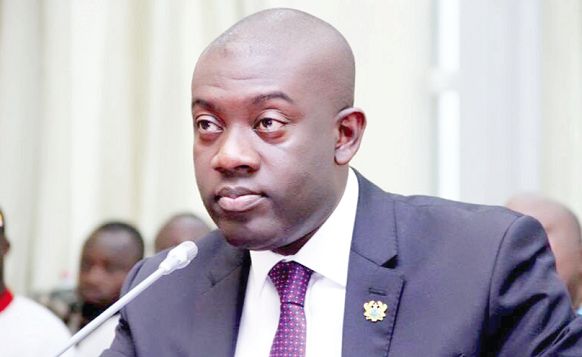
Govt doesn’t intend to increase Presidential staffers - Oppong Nkrumah
The Minister of Information, Mr Kojo Oppong Nkrumah, has denied claims that the government intends to increase staffers in the Office of the President from the current 998 to 1,614.
“The makers of the claim have either confused the Office of Government Machinery (OGM) with the Office of the President (OOP) or are only up to political mischief. Contrary to the claim, staff numbers at the Office of the President and even the Office of Government Machinery are rather going through a programmed reduction,” he told the media at the bi-weekly press briefing yesterday.
The Minority in Parliament alleged that the government intended to increase the number of presidential staffers that would be an additional burden on the public purse.
Explaining the numbers, he said the Executive arm of government was organised into ministries, departments and agencies, with the supervising outfit of the Executive arm referred to as Office of Government Machinery, which comprised 19 different units, including the Office of the President.
The numbers
Referring to the details in the 2018 budget, the Information Minister said in 2018, the established posts for OGM was 1,697, which had rather been reduced to 1,614 in the 2019 budget which was presented to Parliament this month.
“Specifically, the Office of the President, for the avoidance of doubt, is expected to reduce by 69 by the end of 2019. Contrary to the claim peddled last week, there is rather a net reduction of 83 staff at the Office of Government Machinery staff numbers by year end 2019. This will mostly be as a result of retirements that are not being replaced,” he said.
He said the claim of an increase was because the Minority was comparing the Office of the President (998 in 2018), which was part of the 1,697 ceiling, with the entire Office of Government Machinery ceiling for 2019 (1,614).
Substantiating claims
To rid the airwaves and public discourse of speculations, he entreated the media to ask people who made claims about facts to first substantiate them, before giving them media mileage to repeatedly peddle such unsubstantiated claims.
“The basic rule of evidence is that he who alleges has an onus to prove. If we do not push people to first prove their claims and instead give them mileage to keep repeating their false claims, only to ask persons against whom false claims are made to rather come forward and prove their innocence, the media will soon be taken for a ride by people who feel all they have to do is make a claim because you will give them space,” he said.
Mobile Money Interoperability
Meanwhile, Mr Nkrumah announced that the second phase of the Mobile Money Interoperability Project, the system meant to allow
The second phase will complete the country’s financial inclusion triangle that connects bank accounts, mobile money wallet and e-
Addressing the media, Mr Nkrumah said with the successful
Cash free flow
“It will also enable
“The interconnection of the three platforms creates a world of opportunities for financial technologists to develop a plethora of services/payment solutions for the public,” he said.
He said achieving that level of interoperability contributed to digitising cash in the Ghanaian economy, increasing
Vice-President Mahamudu Bawumia, in March 2017, commissioned the first phase of the system which saw the interconnection of the mobile money platforms and the Ghana National Switch (
With more than 1.3 million transactions said to have been recorded so far on the Phase One platform, Mr Nkrumah said it made it possible for customers to send mobile money across networks and from mobile money wallet to bank account and vice versa.
How it works
Mobile money subscribers and e-
Similarly, the interconnection of mobile money and e-
